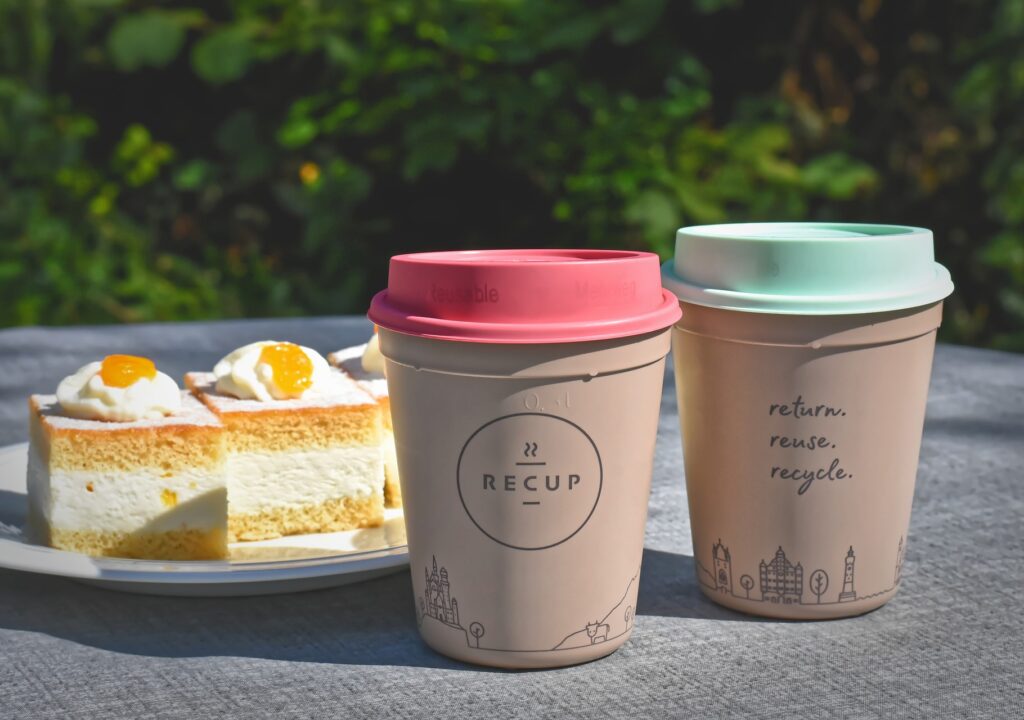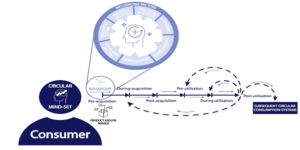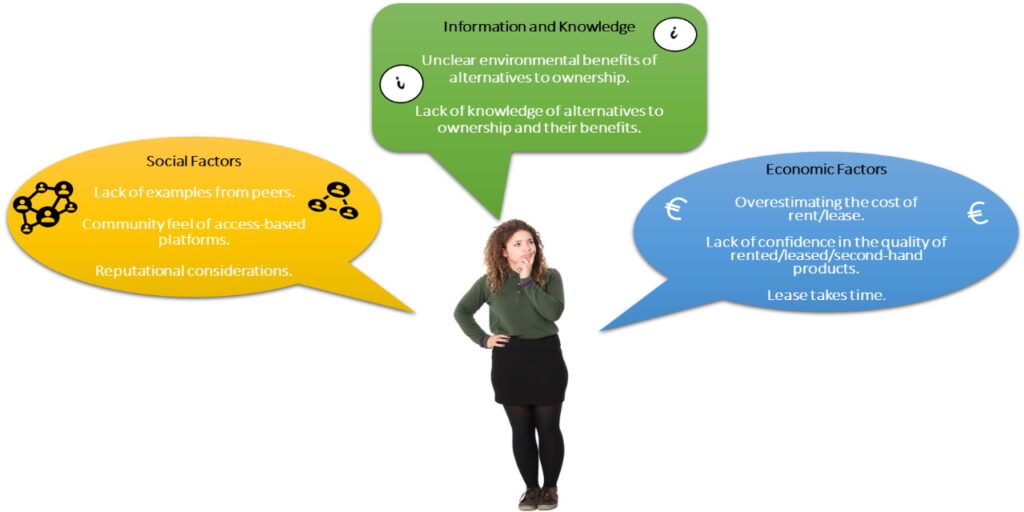
Since a circular economy (CE) aims to optimize products and materials lifetime while maintaining their highest utility and value, the consumer engagement plays a critical role to achieve long-term goals of the CE. Consumers’ behavior and demand towards circular products can play a key role in the transition towards CE.
Author: Malahat Ghoreishi
Our current system which is known as linear system is based on take-make-use-dispose processes. The dominant production-consumption system urges companies to produce more which results increased emission and over extraction of natural resources. Since circular economy has been introduced as a solution to reduce emission and waste, companies are required to deploy systemic changes in their products and services and how they create value for the consumers. However, the challenge concerns consumers’ acceptance of the new circular consumption system which aims to extend the lifecycle of products and materials. Consumers’ attitude towards re-use and repair instead of replacing with new products have great affect on the transition towards circular economy. (European Commission 2018)
The influencing factors on consumers’ behavior in pre-acquisition stage are identified for example as economic factors, legal factors, and environmental factors. As shown in Image 2, in circular consumption systems, products gain several lives and different users. The transition processes towards circular economy are defined as behavioral chains which are the system of unique and repetitive actions which are performed during the consumption of circular products and services. Consumers are in the core in transition towards circular economy and they play a key role in creating and increasing demands for more sustainable and circular products and services. (Gomes et al. 2022)

Image 1. Circular consumption systems (Gomes et al. 2022)
Key Factors that effect on Consumer behavior
European Environment Agency identified five main factors that affects on consumers’ behavior towards circular products as “Economic factors, Fit between needs and offerings, Information used for choices, Social factors, and References and beliefs”. Circular options are not always the best economic options, and in some cases they are more expensive than linear ones. In addition, costs from processing, maintenance, disposal, upgrading, and investing time on recyclable material adds economic challenges and risks to circular protects. On the other hand, it should be considered to what extent the availability, quality, performance and characteristics of products and services meets consumers’ need and are related to their preferences. Information used for choices factors are related to the availability of data and information for consumers to improve decision-making. Full access to the information and sources of circular products is required to understand the distinctive characteristics of circular solutions. Clear information on circular products is required to avoid any misleading guidance and greenwashing influences on consumer choice. Furthermore, Social factors are related to the social norms within the communities and society, common practices, and examples provided by the role models and reference groups. Finally References and beliefs are related to the dimensions of consumer needs such as comfort (convenience), prestige, value given by consumer, brand loyalty, and other personal values. These factors are highly related to the cultural norms. Scientific research showed that economic factors are the major factor effecting on consumers’ decisions, whereas social factors and beliefs are linked to personal psychology and the hardest to be influenced. (Parajuly et al. 2020) Image 3 shows the example of these factors on consumer behavior in purchase stage.

Image 2. Behavior-shaping factors and circular choices (European Environment Agency 2022, modified by Malahat Ghoreishi)
EU have already started to implement measurements for making circular economy related choices more attractive for consumers. For instance, European commission set sustainable product initiatives according to which products should be designed to be more durable, reusable, repairable, recyclable, and more energy efficient. Labels which provide information on products and materials are part of these policies. Regarding to economic policies, reducing taxes for circular options and increasing taxes on linear alternatives are the aim. On the other hand, policies related to eco-design requirements for repairability or ensuring the availability of spare parts and repair services aim to offer more convenient maintenance services. (European Environment Agency 2022)
The transition towards a more sustainable and circular world is essential for the environment, and yet not an easy path. It requires close collaboration between governments, policy makers, companies and consumers, as no goals can be achieved in solo. There is a need to build an ecosystem in which achieving the goals of circular economy will benefit all the actors, where in the core are the consumers. The results of the study by Mykkänen and Repo on consumers’ perspective for circular economy in Finland shows that consumers’ choices about circular products and services in their daily life relies significantly on the domain of consumption. For example, they showed more willingness to use services for some domains whereas for other cases they prefer to buy products. In addition, consumers’ socioeconomic backgrounds cause to certain activities. Other important factors that were identified to have huge influence on attitudes are gender, age, education, income, and household size. Further, some practical circular solutions such as sharing and service economy have been identified as marginal in the society that relies on traditionally valued self-reliance and a do-it-yourself attitude. (Mykkänen & Repo 2021)
In 2020, LAB University of Applied Sciences has been the leading partner for the Aksel project- Co-developing services for sustainable living project. This European project was focused on improving circular and sharing economy-based services to reform markets that helps customers and end users move towards more low-carbon consumption. (Aksel 2020) In addition, since sustainability and circular economy strategies and educations are the main goals in many educational programmes in LAB University of Applied Sciences, consumer behavior for circular economy and sustainable consumption has been taught during different courses such as Lifecycle of Sustainable Products course.
References
Parajuly, K., Fitzpatrick, C., Muldoon, O. & Kuehr, R. 2020. Behavioral change for the circular economy: A review with focus on electronic waste management in the EU. Resources, Conservation & Recycling: X. Vol 6. Cited 30 Jan 2023. Available at https://doi.org/10.1016/j.rcrx.2020.100035
European Commission. 2018. Behavioural Study on Consumers’ Engagement in the Circular Economy. General publication. Cited 19 Dec 2022. Available at https://commission.europa.eu/system/files/2018-10/ec_circular_economy_final_report_0.pdf
Gomes, G.M., Moreira, N. & Ometto, R.A. 2022. Role of consumer mindsets, behaviour, and influencing factors in circular consumption systems: A systematic review. Sustainable Production and Consumption. Vol 32. 1-14. Cited 30 Nov 2022. Available at https://doi.org/10.1016/j.spc.2022.04.005
European Environment Agency. 2022. Enabling consumer choices for a circular economy. Cited 30 Nov 2022. Available at https://www.eea.europa.eu/publications/influencing-consumer-choices-towards-circularity/enabling-consumer-choices-towards-a
Mykkänen, J. & Repo, P. 2021. Consumer perspectives on arranging circular economy in Finland. Sustainability: Science, practice and policy. Taylor & Francis. Vol. 17. 349-361. Cited 19 Dec 2022. Available at https://doi.org/10.1080/15487733.2021.1977500
Aksel. 2020. Co-developing services for sustainable living. Cited 30 Jan 2023. Available at https://lab.fi/en/project/askel
Author
Malahat Ghoreishi is a lecturer at LAB University of Applied Sciences in sustainable solutions programme. She is also a researcher in digitalization and circular economy, focusing on the capabilities on AI for circular solutions and business models.
Illustration: https://pixabay.com/fi/photos/recup-kahvi-mukaan-muovi-kupit-4496795/ (Pixabay Licence)
Published 1.2.2023
Reference to this article
Ghoreishi, M. 2023. The role of consumer behavior in circular economy. LAB Pro. Cited and the date of citation. Available at https://www.labopen.fi/lab-pro/the-role-of-consumer-behavior-in-circular-economy/






